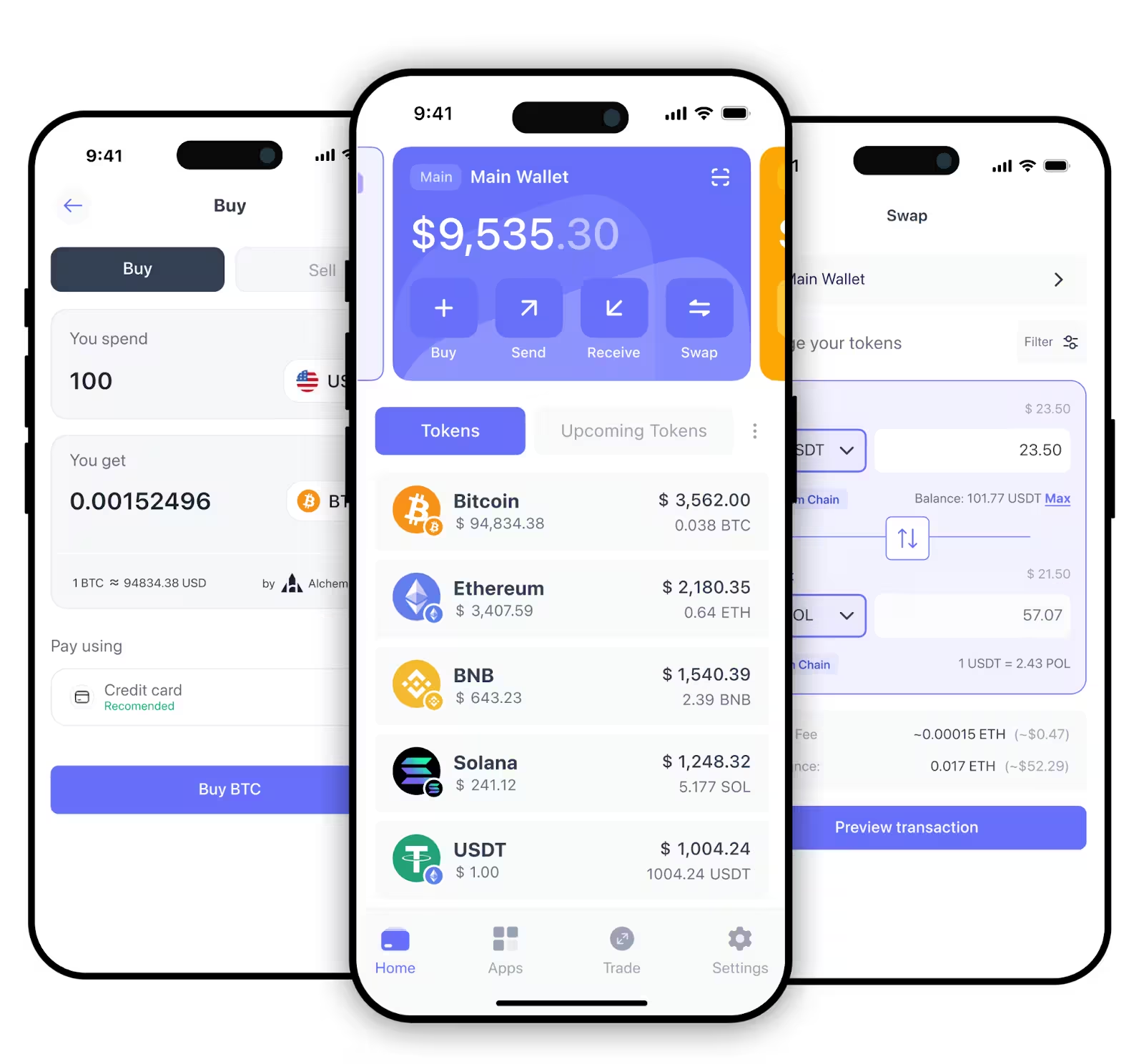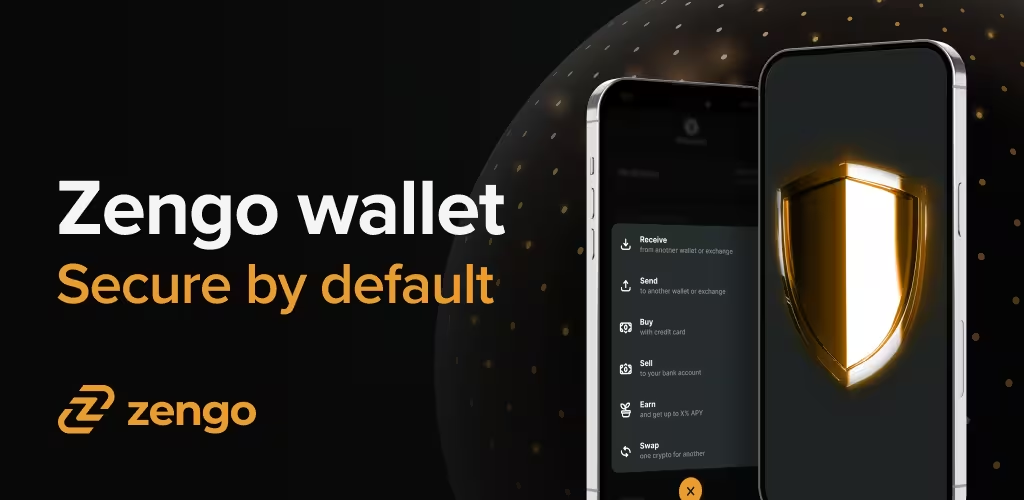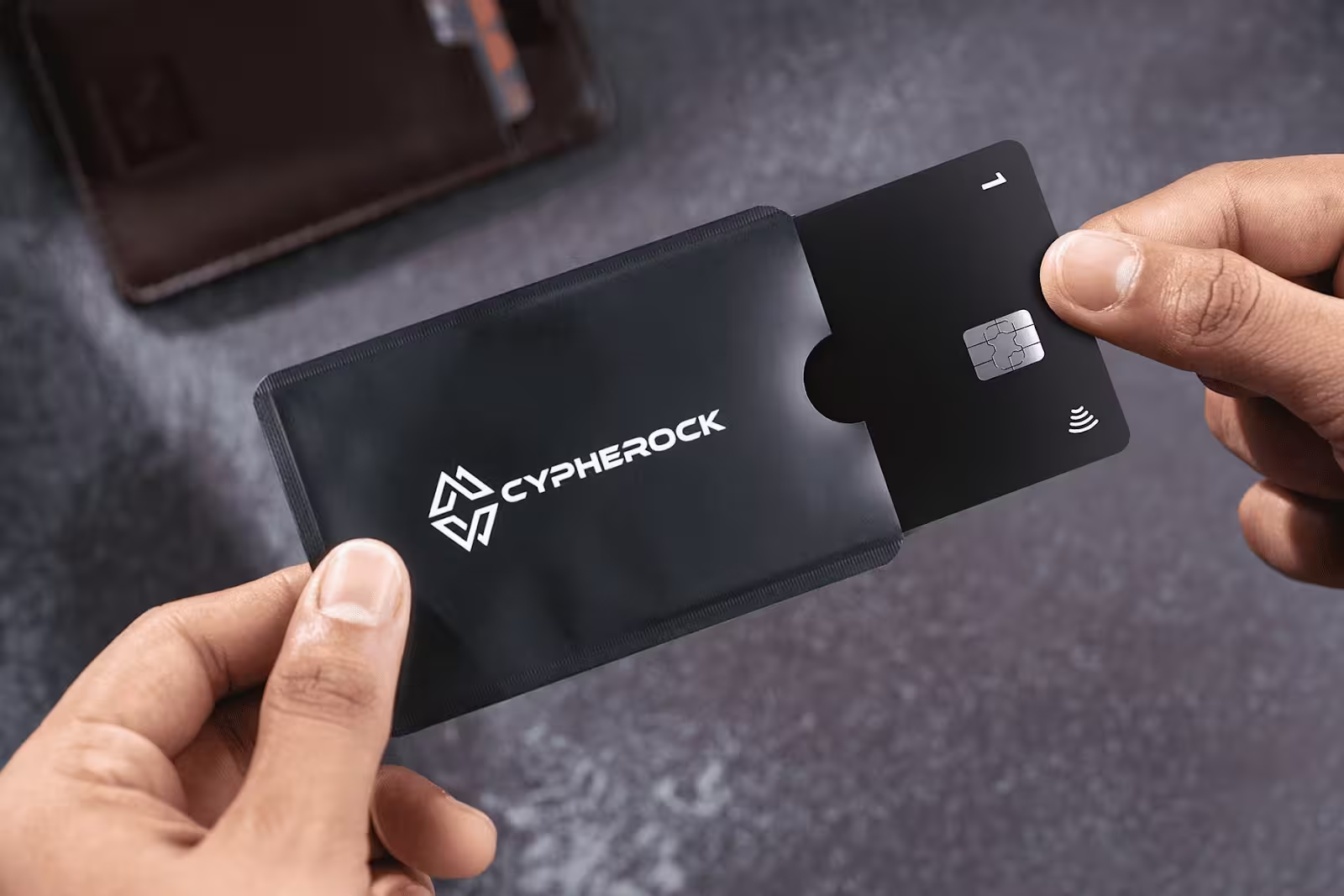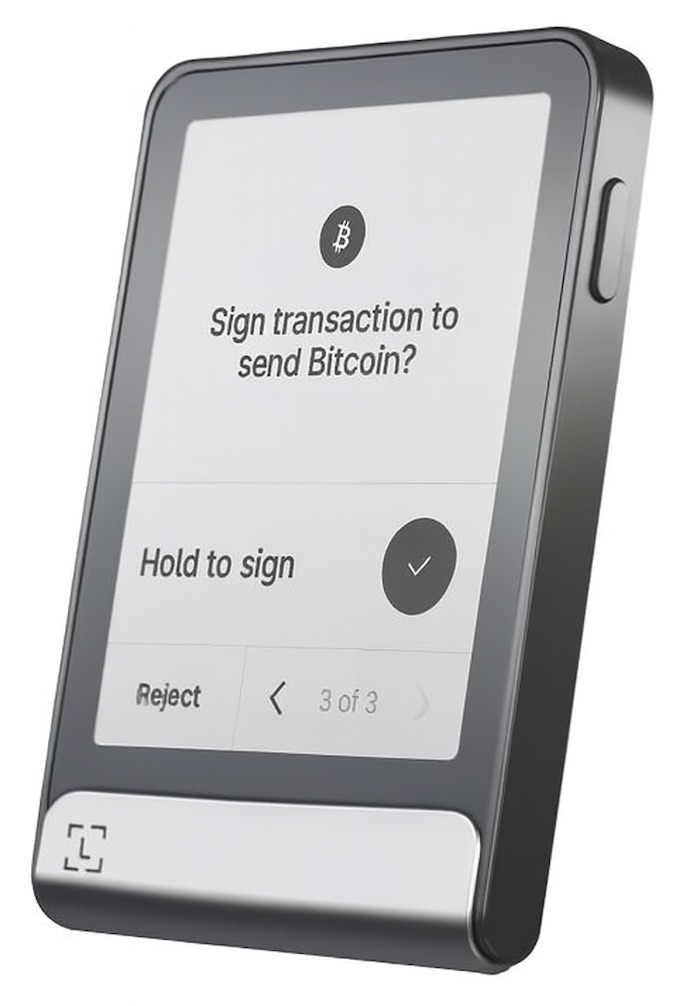Track Smarter. Trade Better.
Turn actionable insights into smarter decisions
Withdraw crypto stress-free
Optimize your crypto taxes before year-end
Looking for a no-KYC crypto wallet that actually respects your privacy? Top choices like Best Wallet, let you hold, swap, and stake without surrendering your personal information to some faceless corporate entity.
Centralized exchanges love collecting your data. Social security numbers, selfies, proof of address, you name it. Meanwhile, anonymous crypto wallets provide self-custody without surveillance.
We've vetted the best no-KYC options that combine bulletproof security with actual usability. Below, we break down the market's top products, compare them head-to-head, and walk you through setup so you can start transacting with privacy intact.
At a Glance – Top No KYC Crypto Wallets in 2026
Here's a quick overview of our vetted picks for maximum privacy and zero surveillance:
<figure class="block-table">
<table>
<tr>
<th>Rank</th>
<th>Wallet</th>
<th>Wallet Type</th>
<th>Price</th>
</tr>
<tr>
<td>1</td>
<td>Best Wallet</td>
<td>Hot (software) wallet</td>
<td>Free to download</td>
</tr>
<tr>
<td>2</td>
<td>Zengo Wallet</td>
<td>Hot (software) wallet</td>
<td>Free to download</td>
</tr>
<tr>
<td>3</td>
<td>Cypherock Wallet</td>
<td>Cold (hardware) wallet</td>
<td>$99–$249</td>
</tr>
<tr>
<td>4</td>
<td>Ledger Wallet</td>
<td>Cold (hardware) wallet</td>
<td>$79–$399</td>
</tr>
<tr>
<td>5</td>
<td>Tangem Wallet</td>
<td>Cold (hardware) wallet</td>
<td>$54.90–$150</td>
</tr>
</table>
</figure>
Our Methodology – How We Vetted These Anonymous Crypto Wallets
Our picks for crypto wallets with no-KYC passed rigorous checks across security architecture, transaction privacy features, anonymity levels, and blockchain compatibility. Every wallet here offers genuine self-custody with no mandatory identity verification.
<figure class="block-table">
<table>
<tr>
<th>Factor</th>
<th>Why It Matters</th>
</tr>
<tr>
<td>Security & Privacy</td>
<td>Wallets must be non-custodial so you control the keys, use strong encryption, offer open-source code for community verification, pass third-party security audits, and collect no personal information</td>
</tr>
<tr>
<td>Reputation & Trust</td>
<td>We evaluate the provider's track record, whether they’ve suffered security breaches, what the crypto community actually thinks of them, and how transparent they are about their development practices</td>
</tr>
<tr>
<td>Transaction Privacy Features</td>
<td>We look for CoinJoin support that mixes your transactions with others to obscure fund origins, IP obfuscation to hide your location, privacy coin integration, and features that keep your on-chain activity untraceable</td>
</tr>
<tr>
<td>Anonymity Level</td>
<td>We check whether the wallets collect IP addresses, require email or phone numbers during setup, embed analytics trackers that monitor your behavior, collect telemetry about how you use the app, and whether they genuinely operate without harvesting any identifiable data</td>
</tr>
<tr>
<td>Cryptocurrency & Blockchain Support</td>
<td>The wallets should support multiple blockchains so you’re not locked into one ecosystem, handle thousands of different tokens, integrate with emerging networks, and allow cross-chain swaps without needing bridge services</td>
</tr>
<tr>
<td>dApp support</td>
<td>The wallets need to connect with Web3 dApps through protocols like WalletConnect, allow access to DeFi platforms for lending and yield farming, integrate with decentralized exchanges for KYC-free trading, manage your NFT collections, and offer staking options</td>
</tr>
<tr>
<td>Backup & Recovery Options</td>
<td>We consider how the wallets handle seed phrase backup, whether they support multi-signature setups requiring multiple approvals for transactions, offer social recovery where trusted contacts can help restore access, and make account restoration easy if you lose your device</td>
</tr>
</table>
</figure>
Expert Analysis – The Best No-KYC Crypto Wallets in 2026
To help you choose the best wallet for your needs, here's a closer look at each of the wallets that prioritize security and anonymity:
1. Best Wallet – All-in-One DeFi Hub with Zero Identity Checks
Best Wallet dominates the best no-KYC crypto wallet space by combining intuitive UX with hardcore privacy features.
Setup takes around three minutes. Simply download it, generate your seed phrase, and you're trading. The multi-wallet management lets you segment assets by risk profile or chain.
Best Wallet also supports hardware wallet imports from Ledger and Trezor, giving you hot wallet convenience with cold storage security when needed.
There’s only one caveat: buying crypto directly with fiat requires tiered KYC verification. But swaps, sends, receives, and DEX interactions remain completely anonymous.
This non-custodial software wallet gives you complete control over private keys while supporting 350+ cryptocurrencies across key blockchains (including Ethereum, Solana, and Bitcoin), with support for 60+ chains underway.

Security features include biometric authentication, encrypted key storage, and multi-factor authentication for added protection.
The wallet connects directly to DeFi protocols, giving you instant access to decentralized exchanges like Uniswap without KYC verification. Your portfolio tracker also shows live valuations while keeping your activity private.
The wallet has maintained a zero-breach track record since launch, albeit being fairly new to the market. Best Wallet also undergoes regular third-party security audits, published on its GitHub.
<figure class="block-table">
<table>
<tr>
<th>Feature</th>
<th>Details</th>
</tr>
<tr>
<td>Crypto & Blockchain Support</td>
<td>350+ cryptocurrencies across 6+ blockchains, including Ethereum, Solana, and Bitcoin</td>
</tr>
<tr>
<td>No KYC</td>
<td>✅For swaps/transfers, but tiered KYC for fiat on-ramps</td>
</tr>
<tr>
<td>Web3 Features</td>
<td>DEX aggregator, DeFi staking, NFT gallery, multi-chain swaps, portfolio analytics, early presale access</td>
</tr>
<tr>
<td>Security</td>
<td>Biometric lock, encrypted key storage, MFA support, auto-lock timeout</td>
</tr>
</table>
</figure>
2. Zengo Wallet – MPC Security Without the Seed Phrase Hassle
Zengo revolutionizes anonymous crypto wallets by eliminating the seed phrase entirely.
Instead, it uses multi-party computation (MPC) technology, splitting your private key into three encrypted shares distributed across your device, the Zengo server, and a recovery file you control. No single party ever holds the complete key.

This architecture solves crypto's biggest UX nightmare: losing your seed phrase means losing access to your digital assets. Zengo lets you recover accounts through facial biometrics and email verification, no 12-word panic attacks required.
You can store 120+ assets across Bitcoin, Ethereum, Polygon, BNB Chain, and other blockchains, covering most of what active traders need.
For Web3 interaction, Zengo handles all the basics, from WalletConnect integration for dApp browsing to built-in DEX swaps and native staking for $ETH, $SOL, and $DOT.
Zengo's Clear Signing feature displays transaction details in plain English before you approve, protecting you from malicious contract interactions.
The Zengo wallet is free to download and use. But for added perks (like asset theft protection and a Web3 firewall), you might want to consider a Zengo Pro subscription for $129.99/year.
Zengo's MPC model, however, means the company maintains one key share, introducing a trust element absent from pure self-custody solutions like MetaMask or hardware wallets.
They're regulated and audited, but privacy purists might prefer fully decentralized alternatives. That said, for users prioritizing recovery over absolute anonymity, it's an intelligent compromise.
<figure class="block-table">
<table>
<tr>
<th>Feature</th>
<th>Details</th>
</tr>
<tr>
<td>Crypto & Blockchain Support</td>
<td>120+ cryptocurrencies across 10+ blockchains, including Bitcoin, Ethereum, Polygon, BNB Chain, and Solana</td>
</tr>
<tr>
<td>No KYC</td>
<td>✅ For storage/transfers, but optional KYC for fiat purchases</td>
</tr>
<tr>
<td>Web3 Features</td>
<td>WalletConnect, DEX swaps, native staking, dApp browser, transaction simulation</td>
</tr>
<tr>
<td>Security</td>
<td>MPC encryption, 3FA biometric authentication, no seed phrase storage, automatic backups</td>
</tr>
</table>
</figure>
3. Cypherock Wallet – Military-Grade Hardware for the Paranoid
Cypherock delivers top security for a crypto wallet without KYC through a hardware architecture that makes Fort Knox look like a garden shed.
This cold wallet uses a Shamir Secret Sharing scheme. It splits your private key across four physical X1 cards and the base unit – the X1 vault, requires just one card and the vault for transaction signing. Lose three cards? Your assets remain accessible.

The vault features a tamper-proof screen and NFC technology for secure transaction signing, protecting against supply chain attacks and firmware exploits.
Setup requires physical card initialization, and the device connects via USB but never exposes private keys to your potentially compromised computer. CySync desktop software handles portfolio management and blockchain interactions.
For storing significant holdings without cloud backups, the X1 card system offers unmatched peace of mind. No KYC is required for purchase or use.
<figure class="block-table">
<table>
<tr>
<th>Feature</th>
<th>Details</th>
</tr>
<tr>
<td>Crypto & Blockchain Support</td>
<td>20+ blockchains, including Bitcoin, Ethereum, Polygon, Solana, and Cardano, with ERC-20/BEP-20 support</td>
</tr>
<tr>
<td>No KYC</td>
<td>✅Fully anonymous operation</td>
</tr>
<tr>
<td>Web3 Features</td>
<td>Hardware-secured dApp signing, MetaMask integration, multi-chain swaps via CySync</td>
</tr>
<tr>
<td>Security</td>
<td>Shamir Secret Sharing with four-card redundancy, tamper-proof display, NFC signing, supply chain attack protection</td>
</tr>
</table>
</figure>
4. Ledger Wallet – The OG Hardware Standard With a New E-Ink Touchscreen and Bluetooth Convenience
Ledger remains the no KYC bitcoin wallet gold standard for cold storage veterans. The flagship Ledger Flex wallet combines one of the best security models with Bluetooth and NFC connectivity. Meanwhile its unique e-ink touchscreen enables you to sign transactions with a clear view of what it is you’re actually signing.
Private keys live on a CC EAL6+ certified Secure Element chip, the same security standard banks use to protect sensitive data.

Ledger supports 22.4K+ cryptocurrencies across more than 100 blockchains. If it’s a legitimate project with actual users, Ledger probably supports it.
Ledger Live software provides portfolio tracking, staking for 35+ networks, which means earning passive income from crypto through Paraswap, a decentralized exchange aggregator.
This cold wallet verifies transactions on-screen before signing, protecting against clipboard malware and phishing attacks.
Setup takes 15 minutes: initialize the device, download and install the Ledger Live app, name your Ledger wallet and select a PIN, and then create a 24-word secret recovery phrase. Once that’s done, you can use the Ledger Live app to install apps and add accounts to your wallet.
Ledger’s customer database was breached in 2020, leaking purchase information. However, private keys stayed safe and no funds were stolen. The incident shows why anonymous purchasing matters for hardware wallets.
Consider buying your Ledger wallet with crypto at physical retailers to maintain complete privacy. All the same, the wallet itself remains entirely KYC-free, regardless.
<figure class="block-table">
<table>
<tr>
<th>Feature</th>
<th>Details</th>
</tr>
<tr>
<td>Crypto & Blockchain Support</td>
<td>22.4K+ cryptocurrencies across 100+ blockchains, including Bitcoin, Ethereum, Solana, Cardano, Polkadot, and Cosmos</td>
</tr>
<tr>
<td>No KYC</td>
<td>✅ For device usage; purchase information collected if bought from Ledger directly</td>
</tr>
<tr>
<td>Web3 Features</td>
<td>Staking on 35+ networks, DEX integrations, NFT management, DeFi dashboard</td>
</tr>
<tr>
<td>Security</td>
<td>CC EAL6+ Secure Element chip, NFC, touchscreen transaction verification, PIN protection, custom OS isolation</td>
</tr>
</table>
</figure>
5. Tangem Wallet – Card-Based Cold Storage for the Minimalist Maximalist
Tangem takes the cold wallet concept literally, delivering private key security in a credit card- form. These NFC-enabled cards contain EAL6+ certified chips, the same security standard used in national IDs.
That means this mobile-first wallet requires no batteries, screens, or cables. Just tap your phone to sign transactions.

Each Tangem package includes two to three cards programmed with the same private key during initialization, providing instant backup redundancy. The cards support 16K+ assets across 80+ blockchains via the Tangem mobile-only app.
Setup is remarkably simple: unbox, scan the card with your phone, set the access code, and you’re done.
Your private key never leaves the card's secure chip, not even during transactions. The mobile app provides a slick interface for token swaps through integrated DEXes, staking, and Web3 browsing via WalletConnect. You're essentially carrying a hardware wallet in your actual wallet.
The card-only design means no on-device transaction verification screen, so you're trusting your phone isn't compromised.
Tangem costs more than software alternatives while offering less flexibility than screen-equipped hardware wallets. But for users wanting Fort Knox security with AirPods-level convenience, it's a compelling option.
<figure class="block-table">
<table>
<tr>
<th>Feature</th>
<th>Details</th>
</tr>
<tr>
<td>Crypto & Blockchain Support</td>
<td>16K+ cryptocurrencies across 80+ blockchains, including Bitcoin, Ethereum, BNB Chain, Cardano, Solana, and Polygon</td>
</tr>
<tr>
<td>No KYC</td>
<td>✅Completely anonymous operation</td>
</tr>
<tr>
<td>Web3 Features</td>
<td>WalletConnect 2.0, multi-chain DEX swaps, DeFi staking, NFT storage, one-tap transaction signing</td>
</tr>
<tr>
<td>Security</td>
<td>EAL6+ certified chip, NFC encryption, dual-card backup, tamper-proof design, no battery/firmware attack surface</td>
</tr>
</table>
</figure>
What is a No-KYC Crypto Wallet?
KYC stands for Know Your Customer, which is when you have to give your wallet provider your personal details. These often include your ID number, address, and even a selfie.
With a no-KYC crypto wallet, however, you can store, send, and receive digital assets without providing government-issued ID or sharing personal details.
Centralized exchanges demand passport scans and proof of address during the KYC process, and even income verification and source of funds documentation for larger transactions.
The no-KYC crypto wallets operate on the principle that financial privacy is a human right, not a privilege. You control your private keys and your funds, without any middleman collecting data that can be hacked, leaked, or subpoenaed.
The wallet doesn’t know your name, location, or how much you’re worth. The downside is that most work with a seed phrase. If you lose it, there’s no customer service hotline to call. You’re the bank now, so you’re responsible for not getting robbed.
Anonymous Hot Wallets vs Anonymous Cold Wallets
Hot wallets are the digital equivalent of keeping cash in your pocket: it’s convenient, immediately accessible, and perfect for daily spending.
These software solutions, like Best Wallet and Zengo, live on your phone or computer, allowing you to swap tokens and interact with dApps in seconds. Active traders and DeFi enthusiasts love them because speed matters when gas fees are spiking.
But that constant internet connection is both a feature and a vulnerability. Your hot wallet is only as secure as the device you are using it on. Malware, phishing sites, and sketchy browser extensions pose real threats.
Modern hot wallets fight back with encrypted key storage and biometric locks, but being online means it’s hackable, even if it’s very, very hard.
Cold wallets like Ledger, Cypherock, and Tangem store your private keys on physical hardware that never touches the internet directly. They sign transactions through USB or NFC, keeping your keys isolated from your potentially compromised device.
The trade-offs are upfront costs, setup takes longer, and you’re managing a device that can be lost, stolen, or accidentally thrown away. Security is their selling point, not convenience.
Smart crypto users go for both types of wallets. Hot wallet for your active trading stack and DeFi positions, and cold storage for serious holdings you’re not touching this month.
Basically, it’s like having spending money in your wallet while your life savings stay in a safe.
Why Use an Anonymous Wallet?
KYC isn’t inherently evil. Anti-money laundering compliance and terrorist financing prevention are real concerns that regulators take seriously. The problem is what happens to all that data afterward.
Every centralized exchange holding millions of identity documents becomes a massive honeypot. One database breach and suddenly your passport scans, home address, and financial history are circulating on dark web marketplaces.
Privacy is about maintaining control over who knows what about your financial life. Here’s why people choose anonymous wallets.
Complete Financial Sovereignty
You’re not asking permission to access your money. No exchange can freeze your account because an algorithm flagged your transaction as suspicious.
You control the keys and your coins in a world where some countries have capital controls and unstable banking systems.
Protection Against Data Breaches
Centralized exchanges can be catastrophic single points of failure.
When BlockFi’s database was breached in 2020, client data was exposed to attackers who immediately launched targeted phishing campaigns.
When exchanges get hacked, your personal information becomes dark web merchandise alongside everyone else’s.
Escape from Surveillance Capitalism
Every KYC transaction builds a permanent record of your financial behavior.
Exchanges sell transaction data to analytics firms, governments subpoena trading histories, and your crypto activities become another dataset in the surveillance economy.
Access in Restrictive Jurisdictions
Citizens in countries like China, Nigeria, or Venezuela face severe cryptocurrency restrictions.
No-KYC crypto wallets provide financial inclusion where traditional systems fail or deliberately exclude people.
Privacy tools aren’t just for tax evaders; they’re also for those living under authoritarian regimes.
Censorship Resistance
PayPal can freeze your accounts. Banks can refuse transactions. Credit cards can be declined.
Non-custodial wallets can’t be censored by any authority. Your transaction goes through because maths says so, not because some compliance officer approved it.
Head-to-Head: Top Crypto Wallets with No KYC At a Glance
Not sure where to start? Let’s compare the key features of our top picks.
<figure class="block-table">
<table>
<tr>
<th>Wallet</th>
<th>Security</th>
<th>Asset Support</th>
<th>Key Features</th>
<th>Cost</th>
</tr>
<tr>
<td>Best Wallet</td>
<td>- Encrypted key storage<br>- Biometric authentication<br>- MFA support</td>
<td>350+ cryptos across 6+ blockchains</td>
<td>- DEX aggregator<br>- Hardware wallet integration<br>- DeFi staking dashboard<br>- Multi-wallet management</td>
<td>Free</td>
</tr>
<tr>
<td>Zengo Wallet</td>
<td>- MPC encryption<br>- 3FA biometric<br>- No seed phrase needed</td>
<td>120+ cryptos across 10+ blockchains</td>
<td>- Facial recognition recovery<br>- Clear signing protection<br>- Inheritance service<br>- Wallet Connect 2.0</td>
<td>Free</td>
</tr>
<tr>
<td>Cypherock</td>
<td>- Shamir Secret Sharing<br>- Four-card redundancy<br>- Tamper-proof display</td>
<td>20+ blockchains with ERC-20/BEP-20 support</td>
<td>- NFC signing<br>- Supply chain protection<br>- MetaMask integration<br>- No cloud backups</td>
<td>Starting from $99</td>
</tr>
<tr>
<td>Ledger</td>
<td>- CC EAL6+ Secure Element<br>- Custom OS isolation<br>- On-device verification</td>
<td>24K+ cryptos across 100+ blockchains</td>
<td>- e-Ink touchscreen<br>- 35+ staking networks<br>- DEX integrations<br>- NFT management</td>
<td>Starting from $79</td>
</tr>
<tr>
<td>Tangem</td>
<td>- EAL6+ certified chip<br>- NFC encryption<br>- Dual-card backup</td>
<td>16K+ cryptos across 80+ blockchains</td>
<td>- Card form factor<br>- No batteries/screen<br>- One-tap signing<br>- WalletConnect dApp access</td>
<td>Starting from $54.90</td>
</tr>
</table>
</figure>
How to Set Up Your No-KYC Wallet in 5 Simple Steps
Setting up an anonymous crypto wallet takes less time than your bank’s quick account opening process and involves exactly zero forms asking for your mother’s maiden name.
The specifics vary between hot and cold wallets, but the core steps remain consistent. We’ll walk you through Best Wallet since it nails the balance between security and usability.
- Visit the official site or App Store: Scan the QR code on the official Best Wallet website or head directly to Google Play or the Apple App store.
- Download and install the wallet: Installation takes under a minute. Open the app, and you'll be prompted to provide an email address purely for bot prevention and account recovery, not KYC surveillance.
- Secure your wallet: Set up biometric authentication for quick access and create a strong PIN as your backup login method. Enable two-factor authentication by providing a phone number.
- Find your public wallet address: Your wallet automatically generates unique public addresses for each blockchain it supports, which you can find by selecting the specific asset.
- Transfer and swap crypto: Send some cryptocurrency to your new wallet address from an exchange or another wallet you control.
Remember that Best Wallet requires KYC to buy or sell crypto for fiat. Swaps, sending, receiving, and using DEXs are KYC-free.
Many privacy-focused users buy their initial crypto through P2P platforms like Bisq or Bitcoin ATMs, then manage everything through Best Wallet KYC-free.
How to Use Crypto Wallets Safely
Our recommended wallets have great security, like EAL6+ certified chips in Tangem, MPC encryption in Zengo, or hardware-isolated signing in Ledger.
But technology only protects against external threats. The biggest vulnerability in crypto security sits between your keyboard and your chair.
Hot wallets face additional risks from malware that logs keystrokes, clipboard hijackers that swap wallet addresses mid-copy, and phishing sites that mimic legitimate dApps. Meanwhile social engineering attacks convince you to verify your seed phrase on fraudulent websites.
Protect yourself through the following practices:
- Use separate wallets for different purposes: Keep your trading wallet separate from long-term holdings. Segment high-value assets from experimental DeFi positions.
- Enable multi-factor authentication everywhere possible: Biometrics plus PIN plus MFA creates defensive layers. Each additional factor exponentially increases an attacker’s difficulty.
- Store seed phrases offline in secure locations: Write on metal plates if you’re serious, because paper burns and floods happen. But never photograph it or digitally store it.
- Keep software updated: Enable automatic updates for your wallet and your operating system. Outdated software is low-hanging fruit for exploits.
- Back up private keys or seed phrases: The moment you create a wallet, back it up before transferring funds. Test your backup by restoring it on a different device to test if it actually works before trusting it with your money.
- Combine hot and cold wallets: Use hardware wallets for significant holdings and long-term storage and software wallets for daily transactions and DeFi interactions. Move profits from hot to cold storage regularly.
- Verify contract addresses before approving transactions: Phishing sites look very much like legitimate ones. Double-check the URL before any transaction.
- Operational security: Don’t discuss your holdings and never connect to public WiFi. Maybe even have a dedicated device only for transactions. Yes, this sounds paranoid, but paranoid investors get to keep their crypto.
Summing Up Our Top KYC-Free Crypto Wallet Picks
Our top no-KYC crypto wallet selections prove you can have top security without handing over your personal data to every platform with a Terms of Service agreement.
Best Wallet takes the crown for combining 350+ asset support with hardware wallet integration and an interface that doesn’t require a computer science degree.
Meanwhile, hardware wallets like Cypherock and Tangem cover the cold storage spectrum, from redundant card systems that survive your worst disaster scenarios to actual credit-card-sized wallets you simply tap against your phone.
Whether you’re yield farming across 12 protocols, running from surveillance capitalism, or just exhausted of how exchanges treat your personal data like a tradable commodity, these wallets actually deliver. They’re built for people who think financial sovereignty should be a standard, not a revolution.
Disclaimer: This article provides information for educational purposes and does not constitute financial advice. Cryptocurrency investments carry significant risk. Always do your own research and never invest more than you can afford to lose.
FAQs
1. What’s the safest no-KYC wallet?
Best Wallet hits the sweet spot between security and ease of use. The MPC encryption and Fireblocks protection with biometric logins ensure you don’t have to worry about seed phrases.
If you’re holding significant amounts, add a hardware wallet like Cypherock to keep your keys offline on tamper-resistant chips, which makes remote attacks essentially impossible.
The smartest setup is Best Wallet for active trading and cold storage for everything you’re holding long term.
2. Can I buy crypto with no KYC?
Yes, through several methods: peer-to-peer platforms like Bisq and LocalCryptos, decentralized exchanges like Uniswap and PancakeSwap for swapping existing crypto, and some Bitcoin ATMs, though many require phone verification.
Best Wallet allows KYC-free swaps but requires verification for direct fiat purchases.
3. Are anonymous wallets safe?
Yes, when used correctly. Anonymous means no identity collection, not weak security. The real risks come from user mistakes: phishing scams, malicious dApps, or lost recovery credentials. Since you control everything, security is your responsibility.
Use hardware wallets for large holdings and hot wallets like Best Wallet for active trading, while maintaining strong passwords and biometric authentication.
















